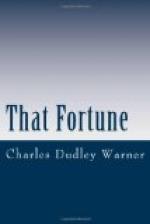“You know I have. And I know I shall like it. It isn’t that, Phil; it is what is the happiest career for you.”
“Well, I will send it to you when it comes back.”
But the unexpected happened. It did not come back. One morning Philip received a letter from the publishers that set his head in a whirl. The story was accepted. The publisher wrote that the verdict of the readers was favorable, and he would venture on it, though he cautioned Mr. Burnett not to expect a great commercial success. And he added, as to terms, it being a new name, though he hoped one that would become famous, that the copyright of ten per cent. would not begin until after the sale of the first thousand copies.
The latter part of the letter made no impression on Philip. So long as the book was published, and by a respectable firm, he was indifferent as a lord to the ignoble details of royalty. The publisher had recognized the value of the book, and it was accepted on its merits. That was enough. The first thing he did was to enclose the letter to Celia, with the simple remark that he would try to sympathize with her in her disappointment.
Philip would have been a little less jubilant if he had known how the decision of the publishing house was arrived at. It was true that the readers had reported favorably, but had refused to express any opinion on the market value. The manuscript had therefore been put in the graveyard of manuscripts, from which there is commonly no resurrection except in the funeral progress of the manuscript back to the author. But the head of the house happened to dine at the house of Mr. Hunt, the senior of Philip’s law firm. Some chance allusion was made by a lady to an article in a recent magazine which had pleased her more than anything she had seen lately. Mr. Hunt also had seen it, for his wife had insisted on reading it to him, and he was proud to say that the author was a clerk in his office—a fine fellow, who, he always fancied, had more taste for literature than for law, but he had the stuff in him to succeed in anything. The publisher pricked up his ears and asked some questions. He found that Mr. Burnett stood well in the most prominent law firm in the city, that ladies of social position recognized his talent, that he dined here and there in a good set, and that he belonged to one of the best clubs. When he went to his office the next morning he sent for the manuscript, looked it over critically, and then announced to his partners that he thought the thing was worth trying.
In a day or two it was announced in the advertising lists as forthcoming. There it stared Philip in the face and seemed to be the only conspicuous thing in the journal. He had not paid much attention before to the advertisements, but now this department seemed the most interesting part of the paper, and he read every announcement, and then came back and read his over and over. There it stood:—“On Saturday, The Puritan Nun. An Idyl. By Philip Burnett.”




